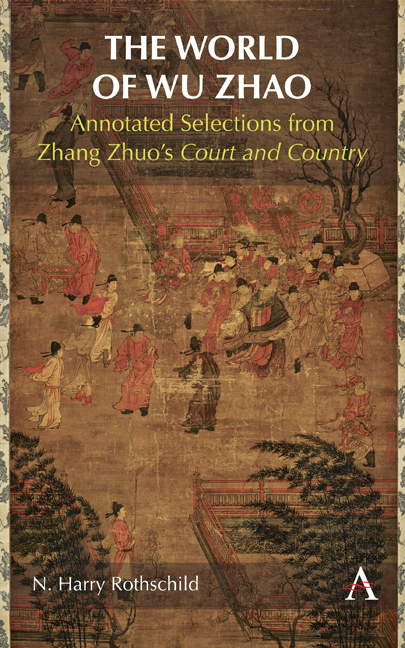Book contents
- Frontmatter
- Dedication
- Contents
- Acknowledgments
- Figures
- Map
- Tables
- Weights and Measures
- Introduction
- Chapter 1 Wu Zhao: her inner palace, her inner circle
- Chapter 2 The culture of the court
- Chapter 3 “Cruel officials”: Wu Zhao’s “teeth and horns”
- Chapter 4 Beyond court and capital: local officials
- Chapter 5 The common people
- Chapter 6 Relationships: men, women, and family in the time of Wu Zhao
- Chapter 7 Generals and military men
- Chapter 8 The frontier and beyond: foreigners and others during Wu Zhao’s reign
- Chapter 9 Religion and the supernatural world
- Chapter 10 Flora, fauna, and the natural world
- Afternote
- Appendix: People and Places
- Notes
- Bibliography
- Index
Chapter 2 - The culture of the court
Published online by Cambridge University Press: 15 November 2023
- Frontmatter
- Dedication
- Contents
- Acknowledgments
- Figures
- Map
- Tables
- Weights and Measures
- Introduction
- Chapter 1 Wu Zhao: her inner palace, her inner circle
- Chapter 2 The culture of the court
- Chapter 3 “Cruel officials”: Wu Zhao’s “teeth and horns”
- Chapter 4 Beyond court and capital: local officials
- Chapter 5 The common people
- Chapter 6 Relationships: men, women, and family in the time of Wu Zhao
- Chapter 7 Generals and military men
- Chapter 8 The frontier and beyond: foreigners and others during Wu Zhao’s reign
- Chapter 9 Religion and the supernatural world
- Chapter 10 Flora, fauna, and the natural world
- Afternote
- Appendix: People and Places
- Notes
- Bibliography
- Index
Summary
IN STAFFING HER COURT, WU ZHAO abruptly appointed men and quickly promoted them; however, she removed or demoted with equal alacrity officials who proved venal, inept, or worse, disloyal. Though unpredictable and at times arbitrary, she sought and assembled men of talent. She was an enthusiastic patron of institutes of learning and played a significant role in the early development of the examination system. One of her reforms to the system was ordering that the names of test-takers be covered, so that examiners would not be influenced by family pedigree or connections, a practice that continued in later eras. One motive underlying Wu Zhao’s dramatic expansion of the examination system was to curtail the influence of great aristocratic clans, who, through long-established networks of privilege and nepotism, filled the upper ranks of the court. Even as empress, she sponsored reforms that greatly increased the volume of successful examination candidates and provided them a fast-track to bureaucratic positions. These new candidates, often men of more humble background, felt beholden to Wu Zhao rather than to highborn relatives and friends in court. Under her patronage and support, the examination system grew dramatically during her half-century as empress, grand dowager, and emperor.
Though wary of the prestige of the old aristocracy that had sought to hinder her ascendancy, Wu Zhao was no social revolutionary; her court was anything but a simple meritocracy. She bolstered her own position while grand dowager and emperor, liberally awarding Wu kinsmen titles and offices as she diligently fashioned an elaborate aristocratic backstory to elevate herself and her clan (see Chapter 1). One episode in Court and Country clearly displays Wu Zhao’s deep-seated classism, describing her reluctance to allow a man who had risen from a position outside the nine ranks to enter the uppermost echelons of the bureaucracy:
In the Zhou, Zhang Heng, rising from a background of Clerk, reached a position of fourth rank. When he was advanced a grade, it was suitable that he enter third rank and he began to wear the insignia. Upon returning from an audience with the emperor, he saw some newly cooked steamed cakes along the roadside and bought one.
- Type
- Chapter
- Information
- The World of Wu ZhaoAnnotated Selections from Zhang Zhuo's <i>Court and Country</i>, pp. 45 - 70Publisher: Anthem PressPrint publication year: 2023

